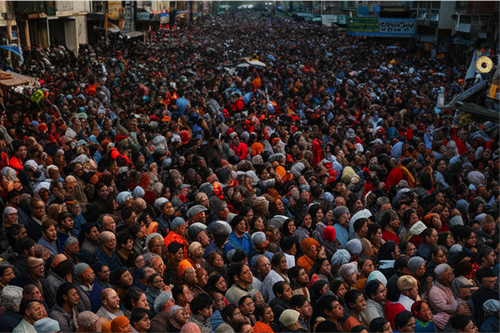The end result of a democratic election must be democracy.
Saji P Mathew OFM
This summer has been a season (for the young) of writing exams and (for the adults) of
casting votes; and for both, waiting expentendly for the results. Come June, and it would
be time for the students to get back to school, and for the politicians (the elected ones)
to get back to the Parliament. Though this seems to be a coincidence, there definitely is
a consequential connection between education and election, or one could qualify them
saying, a good education and a good election. Gore Vidal, an American author, well
known for his outspoken political opinions and his witty and satirical observations of
American society, said about the American electorate, “Half of the American people have
never read a newspaper. Half never voted for President. One hopes it is the same half.”
Looking at the general percentage of voter turnout, and observing both the proportions
of population having no privilege of education, and even if they have, considering the
character of education often provided, we could, in line with Gore Vidal, say about the
Indian electorate, ‘Half the people lack the right education. Half the people never voted
in the elections. One hopes it is the same Half.’
If denying the right to participate in the election process was the bygone way to get the
results in faviour of a privileged few, denying the possibility, or inaccessibility to right
political education for the masses seems to be a contemporary way. In an uneducated
and disengaging electorate, how do people get information, how do they form their
opinions and choices of candidates. They succumb to fake news, false narratives, and
political advertisements that are dishonest and disinformation.
Political Education
Everything improves with education -civic sense, politics, and democratic elections are
no exception. We could have a choice as to whether to learn art, music, or mathematics,
but in the case of political education, we must have a preferential option for it; because
it puts at risk the constitutional rights and civil liberties of every citizen. Such an
education provides everyone with the opportunity to play an active role in moulding the
future of a democratic society. Political education attempts to instruct and motivate
individuals of all ages to participate in societies and communities and make them more
democratic; and be watchdogs of democracy; thus making sure that democracy does not
get reduced to mere majoritarianism.
The Greek city-states in the 5th century BCE had understood democracy as, ‘demos’ and
‘kratos’, meaning, ‘the people’ and ‘power or rule’ respectively; thus democracy is ‘the
power or rule of the people’. It was the 16th president of America, Abraham Lincoln,
who, in the mid 19th century, gave one of the simplest modern explanations of
democracy. He said, democracy is a government "of the people, by the people, and for
the people." Though it sounded as understood clearly, in demographically complex
countries like India, the question emerged, ‘who are the people?’ Democracy began to be
used by those who are more in numbers, and those who have more means, riches, and
privileges to their advantage -thus bringing democracy, considered as the finest form of
modern governance, to its knees. Political thinker Dr BR Ambedkar, influenced by his
teacher, John Dewey, and perhaps inspired by Buddhism, countered and clarified
democracy as a way of life, which could be further said as a society’s concern and
mindfulness for the entire people, especially the marginalised other. It is not just about
‘us’ the majority, but also about ‘them’ the minority.
Ambedkar would place freedom, equality, and fraternity as essential conditions for
democracy, and I would add education to this list; though Ambedkar may not have said
it, his passion for learning and engagement, and how he reached that position of being
the architect of the Constitution of India, would indicate it. Ram Jethmalani, who was an
outstanding lawyer and Rajya Sabha member, believed that the greatest achievement of
Dr Ambedkar was that he gave India a secular constitution although most of our laws
are based on religion and most of our life is immersed in religion. He further clarified,
"secularism means the efficiency and superiority of education over illiteracy; it means
superiority of reason over blind faith, it means the superiority of science over religion.”
Ambedkar was of the view that religion was to be tolerated, but not to be encouraged.
He knew what it takes to become a modern society.
Elections without political education of the electorate can become very manipulative;
and an electorate, which is educated and if unfortunately lacks the power and
possibility of participating in free and fair elections could be frustrated. The end result
of a democratic election must be democracy; and an educated electorate and free and
fair election is the sure way to reach there.
ecoming Enablers
Students choose to do studies in any discipline of their choice, like, science or
commerce; but a good college would insist that while they do their studies in their
chosen disciplines they also engage with art, music, dance, acting, poetry, writing, etc.,
no matter how well or badly, not to make money or fame, but to experience becoming,
to discover what is within them; such an education enables one’s true becoming.
A free electorate with the benefit of fair elections elect the best possible leaders and
government. It is the bounden duty of the elected in the government to enable the
becoming of every people of the country; give them wings, provide them capacity to be
free thinkers, innovators, entrepreneurs, artists, creators, and more. Enabling the
becoming of a people would also mean to combat false narratives, biased policies, and
the interference of archaic religious dogmas and doctrines. The people must be given
the ability to be free choices, question, dissent, participate, and become.